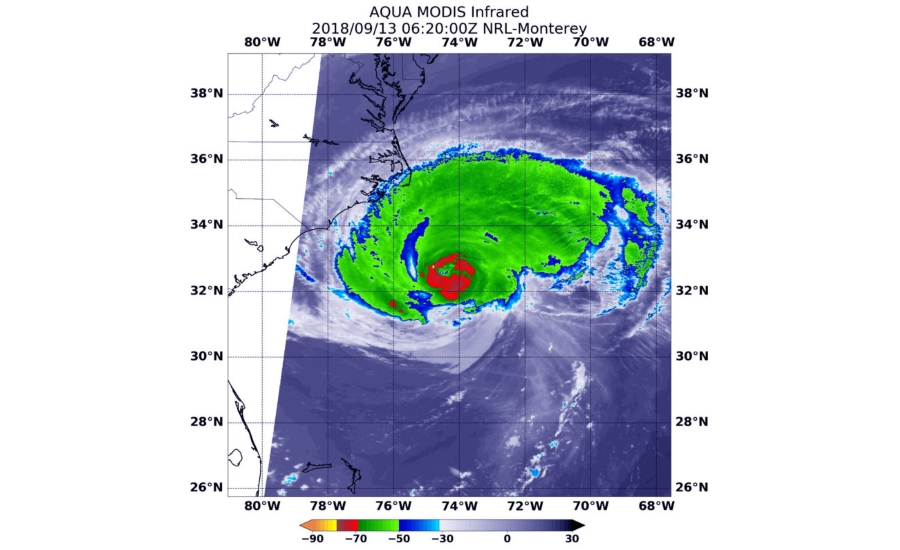PHCC offers last-minute tips as Hurricane Florence makes landfall
The Category 2 hurricane could bring as much as 40 inches of rain to the East Coast

At 2:20 a.m. EDT (0620 UTC) on Sept. 13, the MODIS instrument aboard NASA’s Aqua satellite looked at Hurricane Florence in infrared light. MODIS found a small ring of coldest cloud top temperatures around the eye, as cold as or colder than minus 80 degrees (yellow) Fahrenheit (minus 112 degrees Celsius). Surrounding the eye were thick rings of powerful storms with cloud tops as cold as or colder than minus 70 degrees (red) Fahrenheit (minus 56.6 degrees Celsius). Photo credit: NASA/NRL
Hurricane Florence is expected to bring heavy wind and rain to large parts of the East Coast in the coming days, according to NASA and the National Hurricane Center.
"Though its wind speeds have dropped to make it a Category 2 storm, forecasters warned that the hurricane retained its potential to deliver catastrophic, life-threatening damage, including drenching some areas with up to 40 inches of rain," reports the New York Times.
- Have all company vehicles, generators, and equipment topped off with fuel, with reserves if access to gas stations is not possible.
- Have a system in place to keep in touch with all employees and ensure they are safe. Long range walkie talkies (30+ mile range) can work when cell service is down, but be aware of not using channels used by EMS.
- If your shop is in a low-lying area, consider having authorized employees take a vehicle home or another safe location on higher ground.
- Be ready after the storm to mobilize quickly and help the community with getting repairs done. Train in advance to help techs avoid dangerous situations (power lines down, etc.).
- Have spare gallon jugs of drinking water in vehicles for your staff to give to customers lacking safe water. A general recommendation is that at least a gallon of drinking water is needed per person, per day.
- Avoid charging higher prices for work done in the aftermath of a natural disaster. This not only can lead to bad feelings with customers, it may be illegal in emergency situations.
- If you are a PHCC member company, remember that the PHCC-National Association has a Disaster Relief Fund. This fund provides immediate assistance to member businesses who have been impacted by natural disasters. Please consider donating to this fund or reach out for help if your business is damaged by the storm. Check this page for more details.
HR Considerations
The issue is straightforward for non-exempt employees (i.e. employees subject to overtime pay). Non-exempt employees are paid for the actual time worked. Thus, if they do not report for work or the employer is closed, they are not paid for the day. An employer may choose to allow these employees to use vacation or other paid time off to cover the lost wages.
The issue is a little more complicated for exempt employees (i.e. employees not subject to overtime pay). Exempt employees must be paid if they are ready, willing, and, able to work; this is so even if the employer closes for the day. An employer that remains open during a weather emergency may lawfully deduct one full-day’s absence from the salary of an exempt employee who does not report for work for the day due to adverse weather conditions. The Department of Labor considers this an absence due to personal reasons; therefore, a deduction of a full-day’s pay will not violate the salary basis rule or otherwise affect the employee’s exempt status. An employer may, as an option, require an exempt employee who fails to report for work in this situation take vacation or other paid leave to cover the full-day’s absence. Deductions from an exempt employee’s salary for less than a full-day’s absence are not permitted.
SESCO recommends that clients review all applicable policy and practices to ensure compliance. For assistance, contact us at 423-764-4127 or by email at sesco@sescomgt.com
For the Next Storm
- To be ready for the next storm, pre-create messages to distribute to your customers about preparation they should do in advance of a hurricane – like having you clear building storm drainage lines or replace sump pumps.
- Partner with other trades contractors to have a response team that can help each other know where customers need assistance with different specialties (electrical, water damage/restoration, etc.)
Looking for a reprint of this article?
From high-res PDFs to custom plaques, order your copy today!






